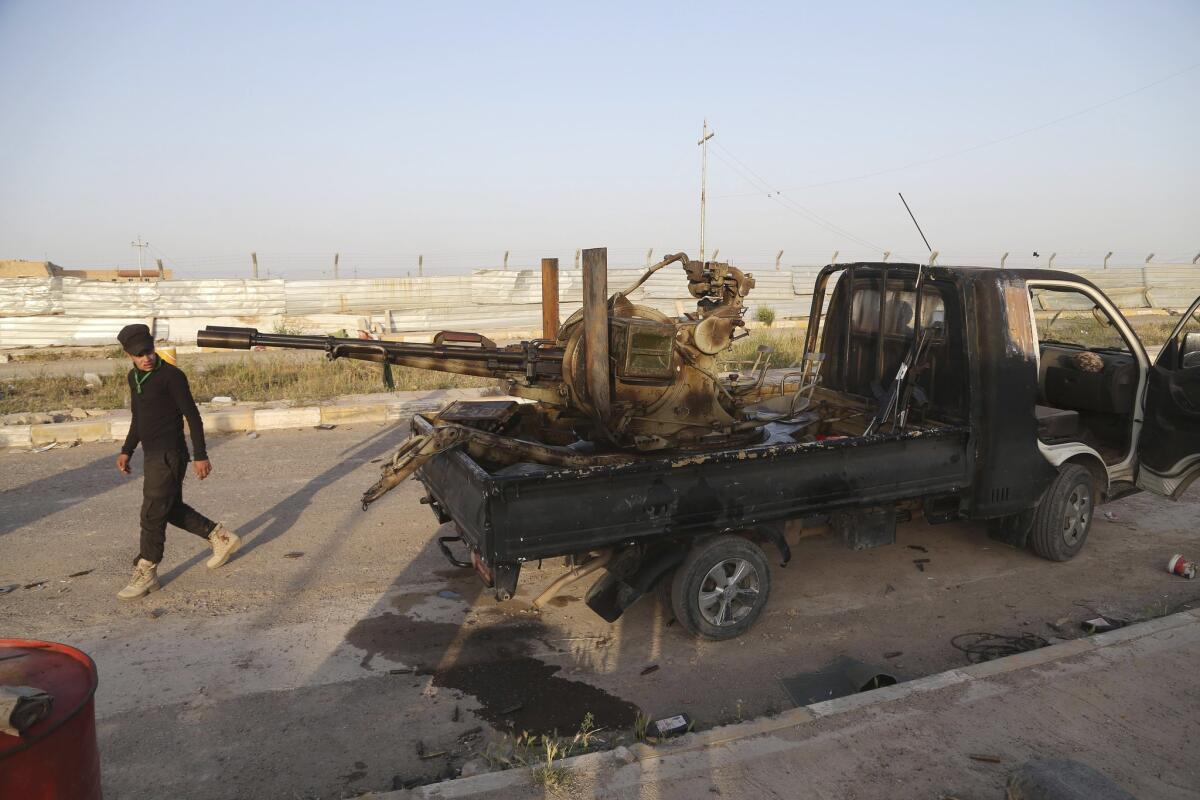Pro-Iraqi government forces push Tikrit offensive after U.S. airstrikes

- Share via
Reporting from Auja, Iraq — Pro-Iraqi government forces Thursday relaunched their offensive to remove Islamic State extremists from the city of Tikrit shortly after U.S. airstrikes requested by the country’s officials hit the area.
The offensive, which began early this month but had stalled, was renewed without participation by many of the Shiite militias that had supported government forces, because they objected to U.S. involvement.
Prime Minister Haider Abadi met late Thursday with military leaders near Tikrit, the hometown of late strongman Saddam Hussein, for a report on their progress after the airstrikes began late the day before.
Abadi had said earlier that Iraqi forces began what he called a final phase in the offensive, and that “not anyone but” Iraqis would claim victory against Islamic State. United States officials said the airstrikes on Tikrit began after Iraqi officials asked for help.
The League of the Righteous, one of the largest and best equipped paramilitary groups, nevertheless withdrew its forces in protest against U.S. intervention.
As evening fell on Auja, the League’s fighters loaded tanks onto transports, forming convoys of Humvees, armored pickup trucks and sedans that made their way back to Baghdad.
“We were hoping to go in today, but then we got the order to pull out,” Saadi Abu Ali, a League militiaman waiting to depart from the group’s field headquarters in Auja. “We don’t know when we will return to the fight.”
Other groups instrumental to the offensive, including the Hezbollah Brigades and the Peace Brigades associated with radical Shiite cleric Muqtada Sadr, refused to join the fight but did not withdraw their units from the area.
Tikrit has been the focal point of a wide campaign to wrest key locations from Islamic State, a Sunni faction that broke away from Al Qaeda. The city’s liberation is seen as an important step toward the liberation of Mosul, snatched by Islamic State militants in June.
The Tikrit offensive brought together army and police units reinforced by thousands of Shiite militiamen. It also included a limited number of Sunni tribesmen from Salahuddin province, in what officials describe as an Iraqi show of unity.
But the main point of pride has been the Iraqi character of the operation. Signposts on the Baghdad Samarra road declare the Tikrit operation is “made in Iraq” and that it is “the battle of all Iraqis.”
The U.S.-led coalition, whose participation helped stop Islamic State’s advance last year through wide areas of Iraq and Syria, had stayed away from the Tikrit offensive.
Observers blamed the coalition’s absence on the domination of paramilitary groups supported by regional powerhouse Iran, which has showered favored militias with weapons, training and fighters from its Basij forces.
Despite promising that the city would be seized within days, government forces ground to a halt at the outskirts of Tikrit. The stoppage was explained as an opportunity for civilians to escape the city. Military personnel also warned of the presence of thousands of explosive devices, as well as Islamic State suicide bombers and snipers hampering the troops’ progress.
On Wednesday, Iraqi President Fouad Massoum said he expected the coalition to launch airstrikes against Tikrit.
A press release issued by the Combined Joint Task Force on Wednesday said coalition forces conducted 17 airstrikes on Tikrit “approved by the Iraqi ministry of Defense.”
“The ongoing Iraqi and coalition airstrikes are setting the conditions for offensive action to be conducted by Iraqi forces currently surrounding Tikrit,” said Lt. Gen. James Terry, according to the press release.
Some government officials were in favor of the coalition strikes.
Head of Parliament Salim Jabouri welcomed the “important aerial support operation offered by the international coalition’s airplanes,” while exhorting Iraqi ground troops to “finish the battle,” according to a statement on his official Facebook page on Thursday.
But others, like Hadi Ameri, head of the Badr Brigades militia, said the strikes were disruptive and had interfered with the troops’ ability to gather information via drones, according to Iraqi outlet Sumariya News.
The pullout of the mostly Shiite Muslim volunteers with the Popular Mobilization Units represented a loss to the operation, according to field commanders.
“We have plenty of security forces here, but of course their presence had an effect,” said Colonel Muhyi Din Ghalees, commander of the 34th armored brigade stationed near Tikrit.
He added that coalition strikes had been effective but refused to comment on political matters.
Bulos is a special correspondent.
More to Read
Sign up for Essential California
The most important California stories and recommendations in your inbox every morning.
You may occasionally receive promotional content from the Los Angeles Times.













